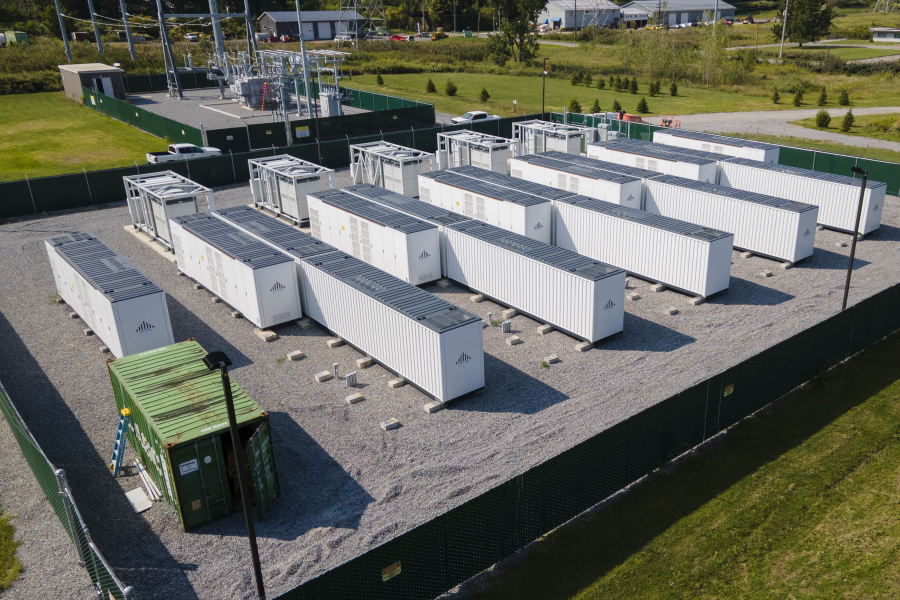Business
Local Communities Challenge Energy Storage Projects Over Fire Risks

Concerns about the safety of large-scale lithium-ion battery installations are leading communities across the United States to oppose energy-storage projects. While these systems are designed to store electricity for use during peak demand, incidents such as a significant fire at a facility in California earlier this year have heightened fears among residents. As a result, numerous localities are enacting temporary moratoriums on the development of these systems.
In July, Island Park, New York, implemented a moratorium following the proposal of a battery storage system near the village line. Mayor Michael McGinty expressed the community’s apprehension, stating, “We’re not guinea pigs for anybody. We are not going to experiment. We’re not going to take risk.” This sentiment reflects a growing trend, as several dozen municipalities across the country have taken similar actions to halt the expansion of large battery systems.
Long Island has emerged as a focal point for activism against these projects. Activists are increasingly concerned that the rapid approvals of energy storage sites may be driven by state goals that they consider unrealistic. In August, Lee Zeldin, the Administrator of the Environmental Protection Agency, visited New York to voice his opposition, suggesting that the state was hastily approving sites to meet “delusional” green power targets. State officials have countered these claims, asserting that all approvals adhere to rigorous safety standards.
As the demand for reliable energy storage grows, the role of battery systems becomes increasingly vital. These systems are designed to absorb low-cost electricity during periods of reduced demand and release it during peak times, thus enhancing grid reliability and reducing the frequency of blackouts. A typical large battery system may consist of rows of shipping containers filled with hundreds of thousands of battery cells.
The United States and China currently lead the world in the rapid integration of battery energy-storage systems. However, countries such as Saudi Arabia, Australia, the Netherlands, Chile, Canada, and the United Kingdom have also begun commissioning or constructing large-scale energy storage projects since 2024, according to research from BloombergNEF.
As energy markets evolve, the push for renewable sources like wind and solar is increasing. These intermittent energy sources necessitate robust storage solutions to ensure stability in power supply. Nevertheless, the fears surrounding potential battery fires may lead to further scrutiny and opposition in communities where these systems are proposed. The debate continues as advocates point to the benefits of battery storage while opponents voice their concerns over safety and environmental impacts.
-

 Lifestyle3 months ago
Lifestyle3 months agoLibraries Challenge Rising E-Book Costs Amid Growing Demand
-

 Sports3 months ago
Sports3 months agoTyreek Hill Responds to Tua Tagovailoa’s Comments on Team Dynamics
-

 Sports3 months ago
Sports3 months agoLiverpool Secures Agreement to Sign Young Striker Will Wright
-

 Lifestyle3 months ago
Lifestyle3 months agoSave Your Split Tomatoes: Expert Tips for Gardeners
-

 Lifestyle3 months ago
Lifestyle3 months agoPrincess Beatrice’s Daughter Athena Joins Siblings at London Parade
-

 World2 months ago
World2 months agoWinter Storms Lash New South Wales with Snow, Flood Risks
-

 Science3 months ago
Science3 months agoTrump Administration Moves to Repeal Key Climate Regulation
-

 Business3 months ago
Business3 months agoSoFi Technologies Shares Slip 2% Following Insider Stock Sale
-

 Science3 months ago
Science3 months agoNew Tool Reveals Link Between Horse Coat Condition and Parasites
-

 Science2 months ago
Science2 months agoSan Francisco Hosts Unique Contest to Identify “Performative Males”
-

 Sports3 months ago
Sports3 months agoElon Musk Sculpture Travels From Utah to Yosemite National Park
-

 Science3 months ago
Science3 months agoNew Study Confirms Humans Transported Stonehenge Bluestones









